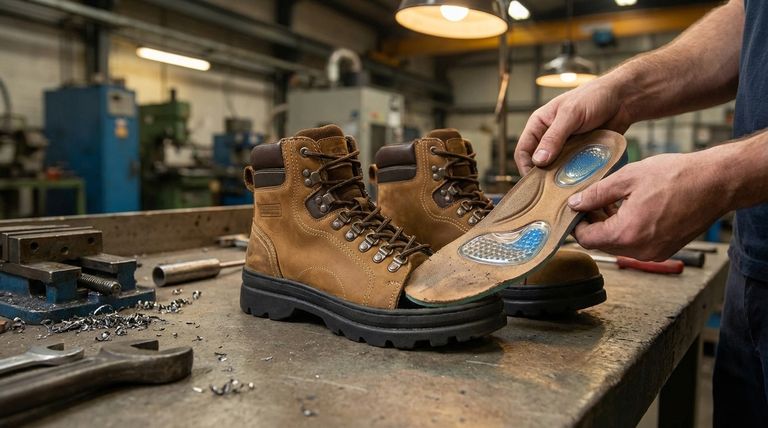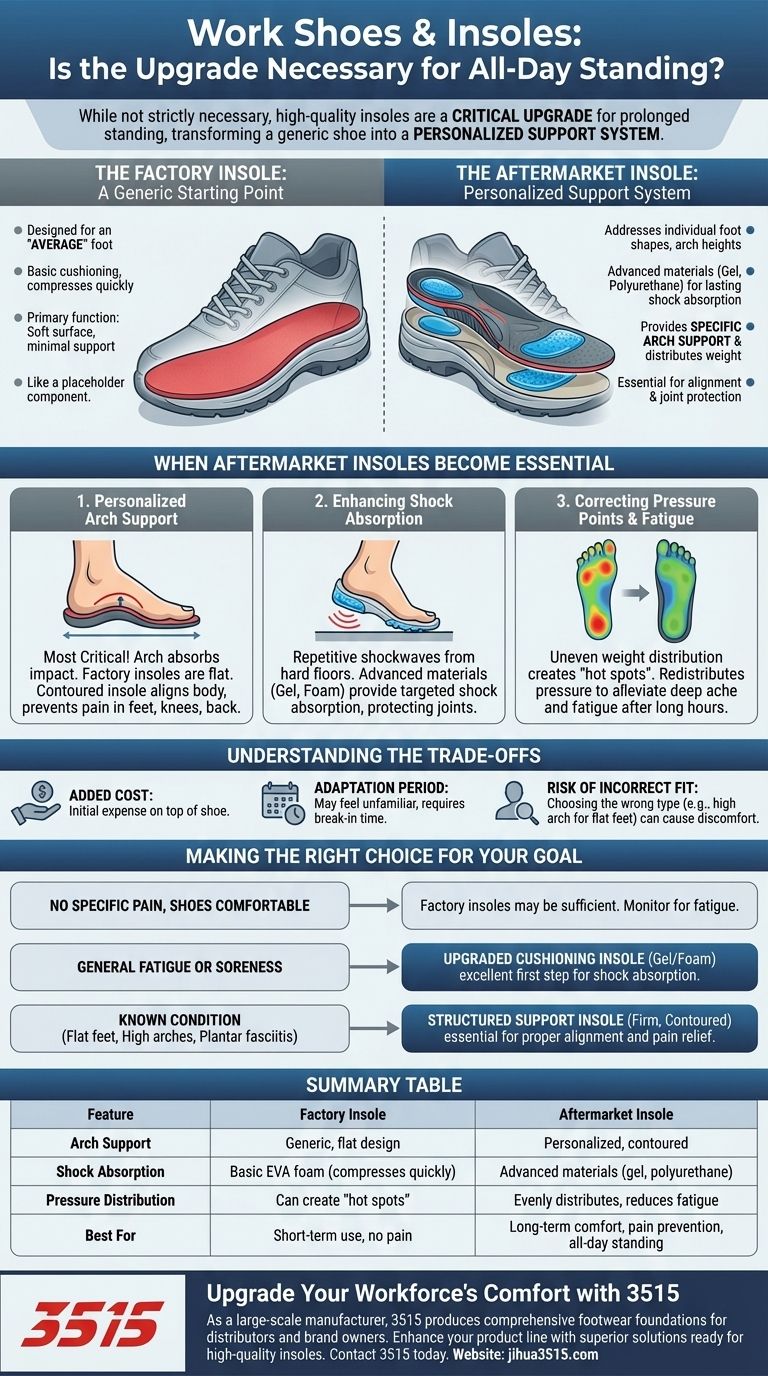While not strictly necessary for every individual, high-quality insoles are a critical upgrade for anyone standing all day, transforming a generic shoe into a personalized support system. They address the shortcomings of standard-issue insoles, which are typically designed for an "average" foot and not for the demands of prolonged standing on hard surfaces.
The core issue is personalization. A work shoe provides a general foundation for safety and cushioning, but an aftermarket insole provides the specific arch support and shock absorption your unique foot structure requires for long-term comfort and health.

The Role of the Factory Insole
A Generic Starting Point
The insole that comes with your work shoe is designed to fit the widest possible range of people. It is a mass-produced component that cannot account for individual foot shapes, arch heights, or specific pressure points.
Think of it as a placeholder—a basic layer of foam that completes the shoe but offers minimal specialized support.
Focused on Basic Cushioning
Most factory insoles are simple sheets of EVA foam. While this material provides a degree of initial cushioning, it often compresses quickly under the constant pressure of your body weight, losing its effectiveness in a short amount of time.
Their primary function is to provide a soft surface, not to correct alignment or provide lasting shock absorption for your joints.
When Aftermarket Insoles Become Essential
The Need for Personalized Arch Support
This is the most critical reason to upgrade. Your foot's arch is the primary mechanism for absorbing impact and distributing weight across your foot.
Factory insoles are flat and offer no real support. For those with high arches or flat feet, a contoured insole that matches their foot shape is essential for preventing pain in the feet, knees, and lower back. Proper arch support ensures your body remains in correct alignment.
Enhancing Shock Absorption
Standing for eight or more hours on concrete or other hard surfaces sends repetitive shockwaves up through your body. The midsole of a shoe handles much of this, but it isn't always enough.
High-quality insoles made from materials like gel or advanced polyurethane foams provide an extra, targeted layer of shock absorption. This directly protects your joints—especially your ankles, knees, and hips—from the cumulative impact of a long workday.
Correcting Pressure Points and Fatigue
Without proper support, your body weight is unevenly distributed across your feet, creating high-pressure "hot spots" on the heel and ball of the foot.
A well-designed insole redistributes this pressure more evenly, which is the key to alleviating the deep ache and fatigue that sets in after hours of standing.
Understanding the Trade-offs
The Added Cost
Good insoles are an additional investment on top of the cost of your work shoes. While they significantly enhance comfort and longevity, this initial expense can be a factor.
The Adaptation Period
A new, more supportive insole can feel unfamiliar or even slightly strange at first. Your feet may need a few days to adapt to the new alignment and support structure.
The Risk of an Incorrect Fit
Choosing the wrong insole can be worse than using none at all. For example, using a high-arch insole when you have flat feet can create new pressure points and discomfort. It's crucial to select an insole that matches your specific foot type.
Making the Right Choice for Your Goal
Ultimately, the decision depends on your individual needs and current comfort level. Your goal should be to create a system where the shoe and insole work together to support you.
- If you have no specific foot pain and your shoes feel comfortable: The factory insoles may be sufficient for now, but monitor for signs of fatigue as the foam wears down.
- If you experience general foot fatigue or soreness by the end of your shift: An upgraded cushioning insole made from gel or high-quality foam is an excellent first step for enhanced shock absorption.
- If you have a known condition like flat feet, high arches, or plantar fasciitis: A structured support insole with a firm, contoured arch is essential for proper alignment and pain relief.
Investing in the right insole isn't just about immediate comfort; it's a direct investment in your long-term joint health and daily well-being.
Summary Table:
| Feature | Factory Insole | Aftermarket Insole |
|---|---|---|
| Arch Support | Generic, flat design | Personalized, contoured for your foot type |
| Shock Absorption | Basic EVA foam (compresses quickly) | Advanced materials like gel or polyurethane foam |
| Pressure Distribution | Can create "hot spots" | Evenly distributes weight to reduce fatigue |
| Best For | Short-term use, no existing pain | Long-term comfort, pain prevention, all-day standing |
Upgrade Your Workforce's Comfort with 3515
As a large-scale manufacturer, 3515 produces a comprehensive range of footwear for distributors, brand owners, and bulk clients. Our production capabilities encompass all types of safety and occupational shoes and boots, designed to be the perfect foundation for enhanced comfort.
We understand that the right shoe is the first step. Let us help you provide superior footwear solutions that are ready to be paired with high-quality insoles for maximum support. Enhance your product line and protect the well-being of the end-users.
Contact 3515 today to discuss your manufacturing needs and how we can support your business goals.
Visual Guide

Related Products
- Custom Wholesale Leather Safety Boots Direct Factory Manufacturing
- Premium Grain Leather Safety Boots for Bulk Supply
- Premium Wholesale Wheat Nubuck Safety Boot with Rapid Lacing System
- Customizable Anti-Smash Safety Boots for Wholesale & Private Label Manufacturing
- Premium High-Cut Waterproof Safety Boots Manufacturing & Wholesale Solutions
People Also Ask
- Why must the outsoles of safety shoes be engineered for anti-slip performance and uniform paving? Master Traction Today
- How are boots designed to meet the ASTM standard for metatarsal protection? Internal vs. External Guard Comparison
- What materials are used in safety shoes? A Guide to Protective Footwear Construction
- How should a safety toe boot fit in terms of toe clearance? A Guide to Perfect Protection & Comfort
- What are the technical advantages of integrating retro-reflective elements directly into the construction of safety shoes and tactical boots? Ensure Permanent Visibility & Compliance.
- What are the properties of rubber outsoles in safety shoes? Unmatched Durability & Slip Resistance
- What roles do specialized protective footwear play during pesticide application in rice paddies? Ensure Chemical Safety
- How have synthetic materials impacted safety shoe design? Achieve Specialized Protection & All-Day Comfort



















